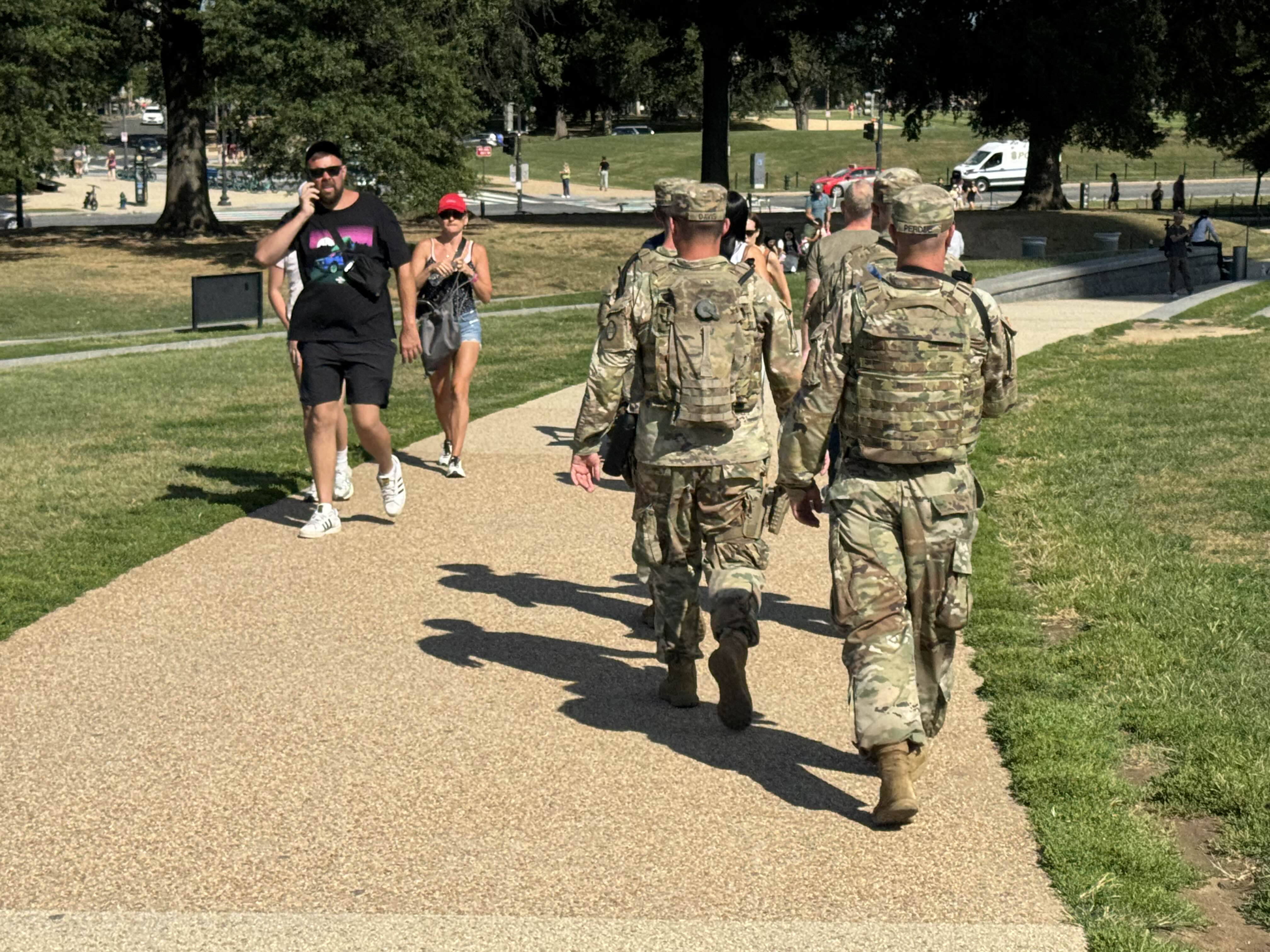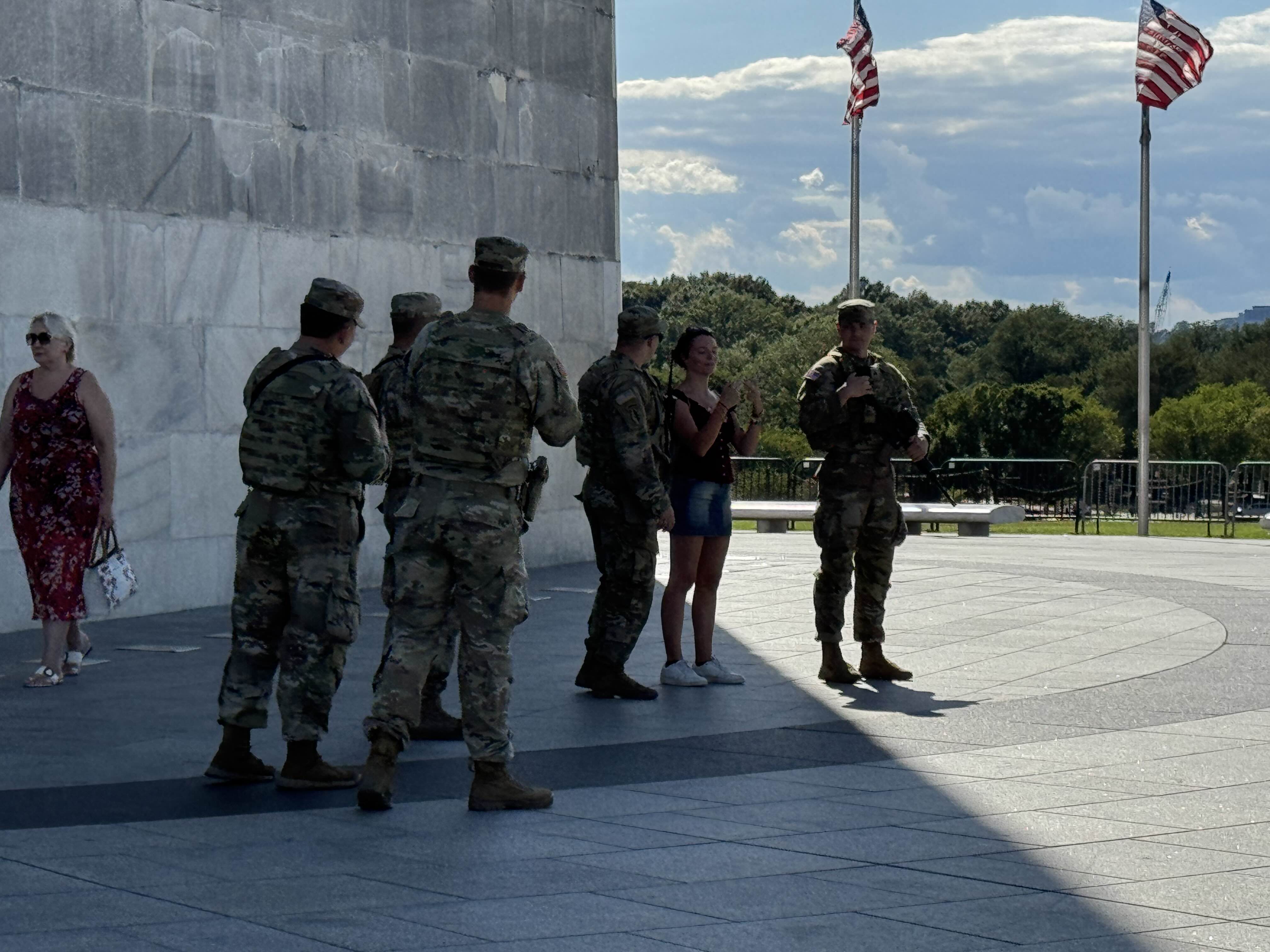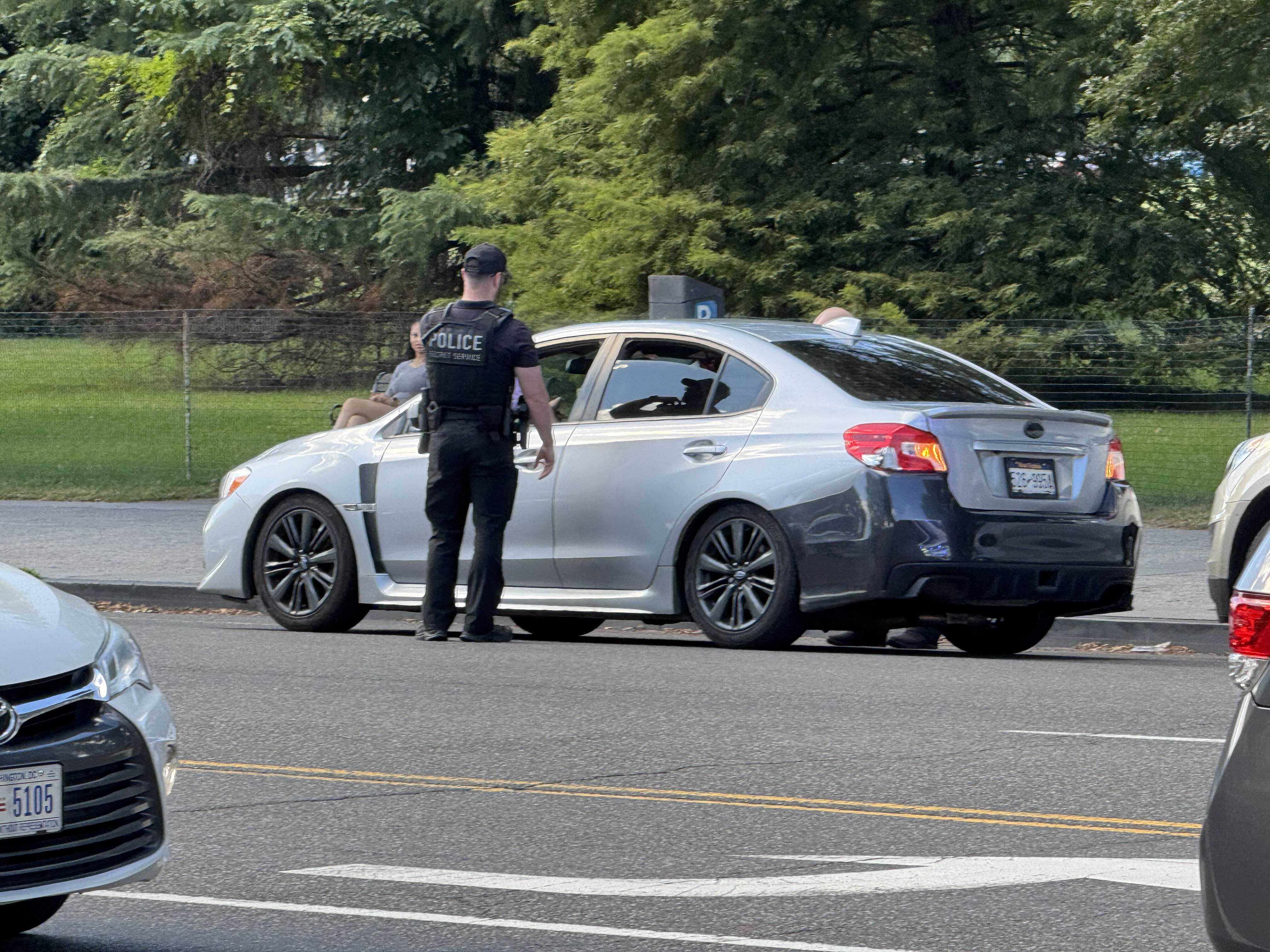Trump orders National Guard, federal police to create specialized public order units

Soldiers from the West Virginia National Guard pass tourists at the Washington Monument on Tuesday, Aug. 26. ZFJ/Alvin Wu
WASHINGTON, Aug. 28 (ZFJ) — President Donald Trump ordered all state National Guard forces as well as certain federal law enforcement agencies to create specialized public order units in an expansion of his declared D.C. crime emergency on Monday, Aug. 25.
“PUBLIC SAFETY AND ORDER” UNITS
In section 2(d)(i) of his executive order, Additional Measures to Address the Crime Emergency in the District of Columbia, Trump requires that Secretary of Defense Pete Hegseth to “immediately create and begin training, manning, hiring, and equipping a specialized unit” within the D.C. National Guard (DCNG) that is “dedicated to ensuring public safety and order in the Nation’s capital.”
The order also commands that each member of the unit be specially deputized so that they have the full powers of federal law enforcement.
“As appropriate and consistent with applicable law, the Attorney General, the Secretary of the Interior, and the Secretary of Homeland Security, in coordination with the Secretary of Defense, shall each deputize the members of this unit to enforce Federal law.”
— Section 2(d)(i), Additional Measures to Address the Crime Emergency in the District of Columbia
In section 2(d)(ii) of the executive order, orders the secretary of defense to make sure each state’s Guard has the resources to support law enforcement “in quelling civil disturbances and ensuring the public safety and order whenever the circumstances necessitate.”
The secretary of defense must also designate a certain number of each state’s trained guardsmen “to be reasonably available for rapid mobilization for such purposes” and to “ensure the availability of a standing National Guard quick reaction force that shall be resourced, trained, and available for rapid nationwide deployment.”
“…the Secretary of Defense shall ensure the availability of a standing National Guard quick reaction force that shall be resourced, trained, and available for rapid nationwide deployment.”
— Section 2(d)(ii), Additional Measures to Address the Crime Emergency in the District of Columbia
Section 2(c) of the executive order directs each federal law enforcement agency participating in the current operation, as well as other agencies in the U.S. Department of Justice (DOJ) as determined by Attorney General Pam Bondi, to “immediately create and begin training, manning, hiring, and equipping a specialized unit that is dedicated to ensuring public safety and order in the Nation’s capital that can be deployed whenever the circumstances necessitate.” These units would also be deployable “in other cities where public safety and order has been lost,” as determined by the president.
Other actions included in the order are creating a federal law enforcement hiring portal specific to the D.C. emergency declaration, hiring more U.S. Park Police officers and federal prosecutors for work in the district, investigating housing and transit services for compliance with crime prevention efforts, and reviewing Metropolitan Police Department (MPD) general orders.
 Soldiers from the West Virginia National Guard take a photo with a tourist at the Washington Monument on Tuesday, Aug. 26. ZFJ/Alvin Wu
Soldiers from the West Virginia National Guard take a photo with a tourist at the Washington Monument on Tuesday, Aug. 26. ZFJ/Alvin Wu
The Posse Comitatus Act prohibits the use of the military for domestic law enforcement, with the exception of the National Guard in times of emergencies. The deployment of regular military forces like the army and navy would require the president to invoke the Insurrection Act, which would require a determination of active rebellion against the U.S. government.
The president’s ability to deploy the National Guard is currently under judicial scrutiny. Attorneys for the DOJ defending Trump’s policies are contending in court that judges lack the power to review the validity of presidential emergency declarations and that to do so would be unconstitutional and judicial overreach.
EXPANSION OUTSIDE D.C.
Trump has repeatedly expressed his desire to expand his federal intervention operation to cities outside of Washington. In a press conference for his initial emergency declaration, he listed numerous cities that he considered “bad, very bad,” which were Chicago, Los Angeles, New York City, Baltimore, and Oakland.
Trump federalized the California National Guard (CANG) and deployed U.S. Marines to Los Angeles in June in the name of protecting immigration agents. A federal court has heard arguments over the legality of the federalization of the CANG, and a judge’s verdict is pending.
Speaking in the Oval Office to reporters on Friday, Aug. 22, Trump said, “Chicago’s a mess. You have an incompetent mayor, grossly incompetent, and we’ll straighten that one out probably next, that’ll be our next one after this.”
Dan Lamothe with The Washington Post reported on Saturday, Aug. 23, that Pentagon officials have been planning a D.C.-style military deployment in Chicago for weeks. Following the report’s publication, Illinois Governor JB Pritzker wrote on X that his state has not requested federal intervention and that there is no emergency requiring the federalization of his guardsmen.
“Donald Trump is attempting to manufacture a crisis, politicize Americans who serve in uniform, and continue abusing his power to distract from the pain he’s causing families,” wrote Pritzker.
Pritzker has since vowed to fight any potential military intervention in Chicago. City officials are taking Trump’s threats seriously, and some locals are bracing for impending federal action.
The Chicago-Sun Times reported on Wednesday, Aug. 27, that the U.S. Department of Homeland Security (DHS) has requested support from Naval Station Great Lakes to execute an L.A.-style immigration enforcement operation in September. It is presently unclear whether the National Guard will also be involved in the operation, but the potential is on the table.
 Uniformed U.S. Secret Service officers conduct a traffic stop beside the Washington Monument on Tuesday, Aug. 26. ZFJ/Alvin Wu
Uniformed U.S. Secret Service officers conduct a traffic stop beside the Washington Monument on Tuesday, Aug. 26. ZFJ/Alvin Wu
Trump has also threatened to send troops to Baltimore in an escalating fight with Maryland Governor Wes Moore, who has condemned the D.C. intervention.
“Wes Moore’s record on Crime is a very bad one, unless he fudges his figures on crime like many of the other ‘Blue States’ are doing,” Trump wrote on Truth Social. “But if Wes Moore needs help, like Gavin Newscum did in L.A., I will send in the ‘troops,’ which is being done in nearby DC, and quickly clean up the Crime.”
Baltimore Mayor Baltimore M. Scott also condemned the D.C. operation, noting that his city is seeing a 50-year low in violent crime.
“If Trump wants to roll into Baltimore purely to stage a photo op and spew racist narratives about Black-led cities, I speak for the vast majority of our residents when I say: We are not interested,” wrote Scott in a statement on X that also included a list of demands for the federal government, which included reinstating federal grants for violence intervention programs, gun control measures, and investigative cooperation between city and federal law enforcement.
References
- The White House - ADDITIONAL MEASURES TO ADDRESS THE CRIME EMERGENCY IN THE DISTRICT OF COLUMBIA - https://www.whitehouse.gov/presidential-actions/2025/08/additional-measures-to-address-the-crime-emergency-in-the-district-of-columbia/ (ARCHIVE)
- The White House - Fact Sheet: President Donald J. Trump Takes Additional Measures to Address the Crime Emergency in the District of Columbia https://www.whitehouse.gov/fact-sheets/2025/08/fact-sheet-president-donald-j-trump-takes-additional-measures-to-address-the-crime-emergency-in-the-district-of-columbia/ (ARCHIVE)
- C-SPAN - President Trump Says Chicago is Next for Law Enforcment Surge - https://www.c-span.org/clip/white-house-event/president-trump-says-chicago-is-next-for-law-enforcment-surge/5170306
- The Washington Post - Pentagon plans military deployment in Chicago as Trump eyes crackdown - https://www.washingtonpost.com/national-security/2025/08/23/trump-chicago-military-national-guard/
- Goverbnor JB Pritzker - @GovPritzker (X) - The State of Illinois at this time has received no requests or outreach from the federal government asking if we need assistance, and we have made no requests for federal intervention. https://x.com/GovPritzker/status/1959421955339145446
- The Associated Press - Democratic governors look to derail Trump’s plan to send National Guard to Chicago and other cities - https://apnews.com/article/trump-national-guard-troops-democrats-cities-chicago-988a659d9d13deb1e7a8f52cf47efef8 (ARCHIVE)
- Chicago Office of the Mayor - Mayor Brandon Johnson Statement On President Trumps Comments About Deploying The National Guard To Chicago - https://www.chicago.gov/city/en/depts/mayor/press_room/press_releases/2025/august/Statement-National-Guard-Chicago.html (ARCHIVE)
- The Associated Press - Trump administration asks military base near Chicago for support on immigration operations - https://apnews.com/article/trump-immigration-military-base-4be8ec065a8749bafd326333a1f1c767 (ARCHIVE)
- Chicago Sun-Times - Trump’s planned Chicago blitz would use naval base to house ICE agents, possibly National Guard - https://chicago.suntimes.com/the-watchdogs/2025/08/27/donald-trump-chicago-downtown-ice-immigration-national-guard-brandon-johnson-jb-pritzker (ARCHIVE)
- Donald J. Trump - @realDonaldTrump (Truth Social) - Governor Wes Moore of Maryland has asked, in a rather nasty and provocative tone, that I “walk the streets of Maryland” with him. https://truthsocial.com/@realDonaldTrump/posts/115084149454997135
- BRandon M. Scott - @MayorBMScott (X) - Whether the President chooses to accept @GovWesMoore’s invitation or not, here are the commitments our city needs to see from the President. https://x.com/MayorBMScott/status/1958910838351556827
